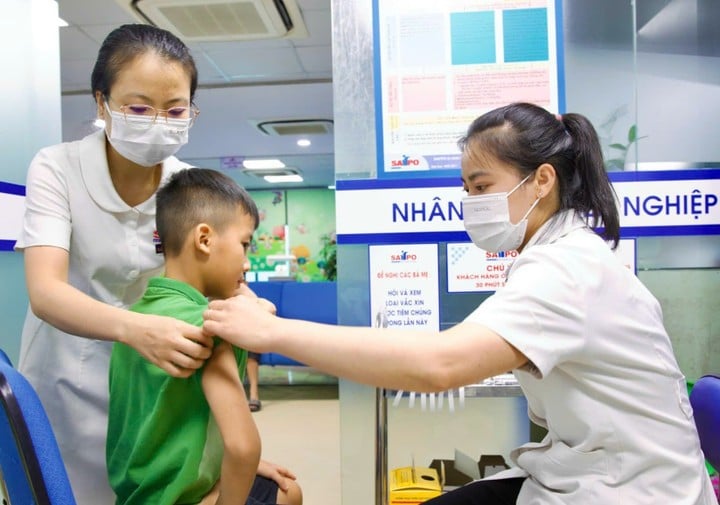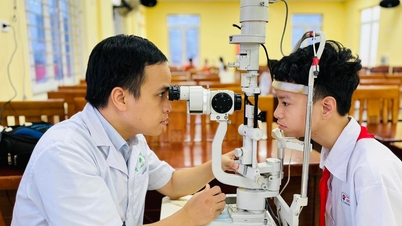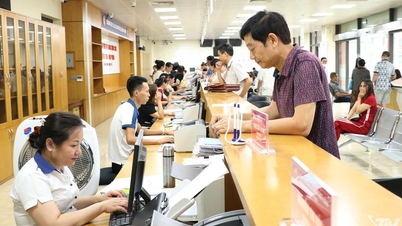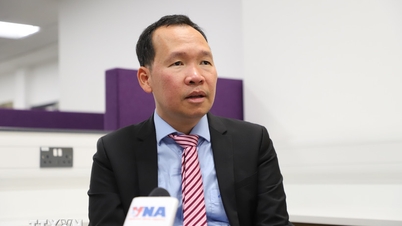At An Hung Primary School (Duong Noi Ward, Hanoi ), there was a class with only half the number of students, 20-30 students were absent due to fever, cough, and respiratory infection. Most of them tested positive for influenza A.
According to hospital records, the number of influenza A cases in Hanoi is increasing rapidly, especially among young children - a group susceptible to severe complications. The Central Hospital for Tropical Diseases is currently treating nearly 50 inpatients with influenza A, most of whom are children; the number of outpatient visits has increased dramatically in the past few weeks.
A 16-month-old girl in Hanoi was brought to the hospital with a persistent high fever, dry cough, runny nose, wheezing and a cough with thick phlegm. Tests showed that the child was positive for Influenza A, lungs show signs of secondary infection.
X-ray images showed bilateral bronchial and lung lesions; CRP index increased more than 10 times normal, indicating severe infection.
If not detected and treated early, the disease can quickly progress to acute respiratory failure or sepsis. After two days of intensive treatment, the child's fever has subsided and he is breastfeeding again, but he still needs to be closely monitored.

MSc. Dr. Nguyen Dinh Dung said, influenza A is infectious diseases acute, transmitted through the respiratory tract, can occur at any age but is most dangerous for young children, the elderly and people with underlying diseases.
“ The early stages of influenza A often resemble the common cold, but can progress rapidly, causing pneumonia, respiratory failure or sepsis if not treated promptly ,” he warned.
According to Dr. Dung, most children with influenza A have high fever, increasing cough, runny nose, fatigue, and fussiness. Older children may have body aches and joint pain, while younger children are prone to convulsions due to high fever, vomiting, and diarrhea. When the disease is severe, children may show signs of lethargy, refusal to breastfeed, rapid breathing, or chest retraction - warning signs of complications that require immediate hospitalization.
At the National Children's Hospital, in just over a month, more than 3,700 children came to see a doctor for the flu, nearly 500 had to be hospitalized, many cases of pneumonia, otitis media, and even convulsions due to high fever.
Dr. Tran Van Ban, Head of the Pediatrics Department of Hong Ngoc Phuc Truong Minh General Hospital, said that in October 2025, the department received more than 2,000 children with influenza A, a 10-fold increase compared to the same period last year.
“ Initially, many cases only had a mild fever and dry cough, but after 2 days, the condition worsened with high fever, convulsions, and pneumonia. Most of the cases were due to children not being fully vaccinated against the flu and parents using drugs at home on their own ,” he said.
Doctors say the prolonged cold and rainy weather is creating favorable conditions for the flu virus to develop and spread. Although most patients can recover on their own after 5-7 days, if left untreated, the disease can easily cause dangerous complications, especially for children, the elderly and pregnant women.
Not only in Hanoi, at Con Cuong Secondary School for Ethnic Minorities ( Nghe An ), Nearly 400 students are temporarily absent from school to avoid spreading the virus. According to Mr. Lo Van Thiep, the school's principal, about 160 students have been confirmed to have influenza A, mostly with mild symptoms, only a few cases have had to be hospitalized for observation.
Dr. Dao Huu Than, Head of the Department of Infectious Disease Prevention (CDC Hanoi), recommends that people should get vaccinated against influenza every year - the simplest and most effective measure to help prevent the disease and limit complications. Parents should take children from 6 months to under 5 years old, and people with chronic diseases to get vaccinated early.
According to Dr. Le Thi Kim Hoa, representative of the Safpo/Potec vaccination system, influenza viruses frequently change antigens. Each year, the World Health Organization (WHO) will forecast circulating strains and guide the production of appropriate vaccines. Vietnam is in the Northern Hemisphere, so people should get vaccinated against influenza every August-September to be protected throughout the winter-spring season.
Source: https://baolangson.vn/cum-a-bung-phat-hang-loat-hoc-sinh-phai-nghi-hoc-5064682.html




![[Photo] Deep sea sand deposits, ancient wooden ship An Bang faces the risk of being buried again](https://vphoto.vietnam.vn/thumb/1200x675/vietnam/resource/IMAGE/2025/11/13/1763033175715_ndo_br_thuyen-1-jpg.webp)


































































![[Photo] Panorama of the 2nd Vietnam-Cambodia Border Defense Friendship Exchange](https://vphoto.vietnam.vn/thumb/402x226/vietnam/resource/IMAGE/2025/11/13/1763033233033_image.jpeg)



















![Dong Nai OCOP transition: [Article 3] Linking tourism with OCOP product consumption](https://vphoto.vietnam.vn/thumb/402x226/vietnam/resource/IMAGE/2025/11/10/1762739199309_1324-2740-7_n-162543_981.jpeg)







Comment (0)